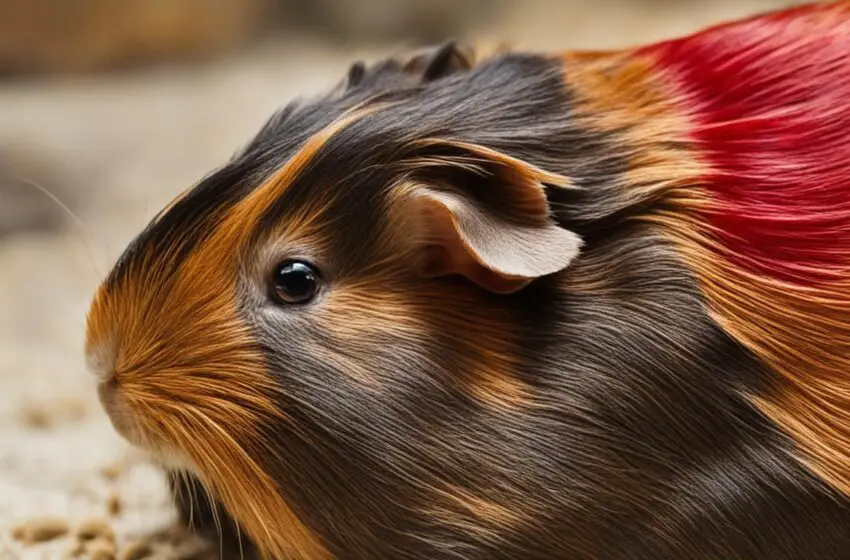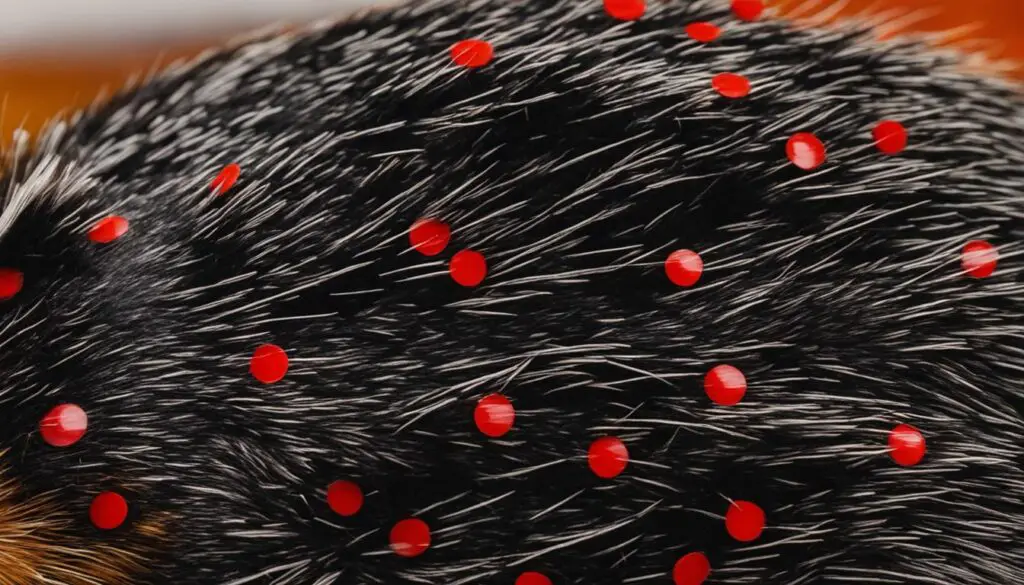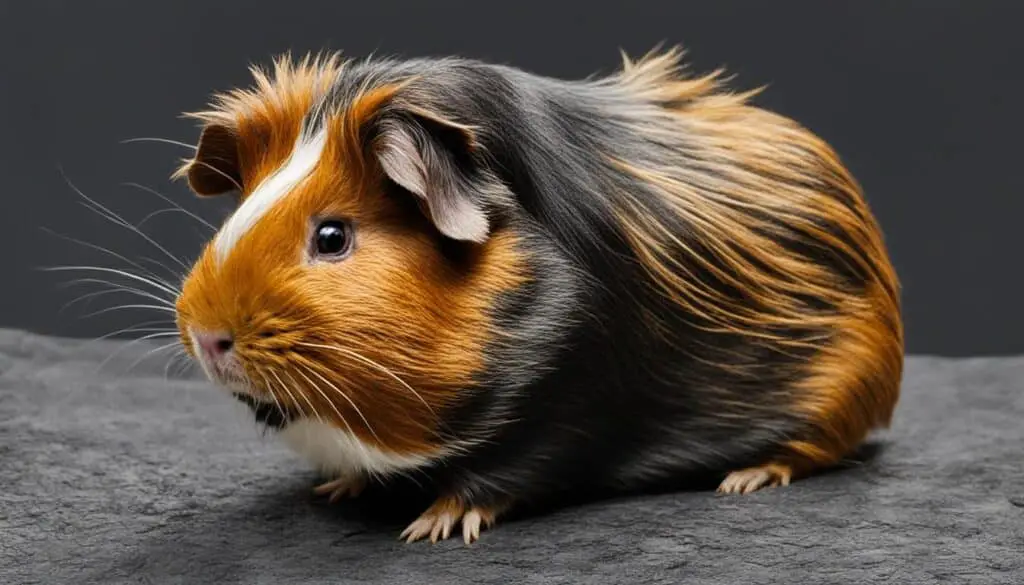Addressing Common Skin Problems in Guinea Pigs

I will discuss the different skin conditions that can affect guinea pigs and provide tips for managing these issues.
Guinea pigs are susceptible to a variety of skin problems that can impact their overall health and well-being. It is essential for guinea pig owners to be aware of these common skin conditions and learn how to prevent and address them effectively.
Guinea pig skin problems can manifest in various ways, including mites and parasites, fungal infections, dry skin, and dermatitis. Identifying these issues early on and taking appropriate action is crucial to ensure the comfort and health of your guinea pig.
Key Takeaways:
- Guinea pigs are prone to various skin problems, including mites, fungal infections, dry skin, and dermatitis.
- Vigilance and regular observation are critical in detecting any skin issues in guinea pigs.
- Consulting a veterinarian is vital for a proper diagnosis and treatment plan.
- Proactive measures, such as regular grooming, providing a balanced diet, and maintaining cleanliness, can help prevent skin problems in guinea pigs.
- By addressing skin problems promptly and effectively, guinea pigs can lead healthy and comfortable lives.
Mites and Parasites
Guinea pigs are susceptible to infestations of mites and parasites, which can cause itching, hair loss, and skin irritation. Some of the common parasites that affect guinea pigs include Sarcoptes and Trixacarus mites. These tiny pests burrow into the skin and lay eggs, leading to a condition known as mange.
Mange in guinea pigs can be distressing for both the pet and their owner. Fortunately, there are effective treatment options available to combat guinea pig mites and parasites. It is crucial to seek professional guidance from a veterinarian for an accurate diagnosis and suitable treatment plan.
Topical medications prescribed by veterinarians are commonly used to treat guinea pig mites. These medications are specifically formulated to combat the parasitic infestation and provide relief to affected guinea pigs.
In addition to medication, maintaining a clean living environment for your guinea pig is essential. Regular cleaning and disinfection of the cage, bedding, and accessories can help prevent the spread of mites and parasites. It is also advisable to isolate infected guinea pigs and avoid contact with other animals until they have been treated and are free from infestation.
“Treating guinea pig parasites requires a combination of medication and diligent hygiene practices.”
Remember, prevention is better than cure, so it is essential to take appropriate preventive measures to protect your guinea pig from mites and parasites. Regularly inspect your pet for any signs of infestation, such as excessive scratching, hair loss, or inflamed skin. Promptly seek veterinary attention if you suspect a parasitic infestation.
Tips for preventing guinea pig mites and parasites:
- Keep your guinea pig’s living area clean and regularly disinfect their cage.
- Avoid contact between your guinea pig and other animals suspected of having mites or parasites.
- Maintain good personal hygiene by thoroughly washing your hands after handling your guinea pig or cleaning their cage.
- Provide your guinea pig with a balanced diet and ensure they have access to fresh, clean water at all times.

By taking proactive measures to prevent and promptly treat guinea pig mites and parasites, you can help ensure the well-being and comfort of your furry friend.
Fungal Infections
Fungal infections, particularly ringworm, are a common skin problem in guinea pigs. Ringworm, highly contagious, can be transmitted to humans. It is characterized by circular patches of hair loss with red, scaly skin.
To effectively treat guinea pig fungal infections, including ringworm, a combination of approaches is necessary. This includes:
- Antifungal medications: Prescribed by a veterinarian, antifungal medications can help eliminate the fungal infection. Following the recommended dosage and duration of treatment is crucial for successful outcomes.
- Cleaning and disinfection: Thoroughly clean and disinfect your guinea pig’s environment to remove any fungal spores. Ensure that all bedding, toys, and living areas are properly sanitized.
- Isolation: Infected guinea pigs should be isolated from healthy animals to prevent the spread of the infection. Separate housing and limited contact are necessary until the infection is fully resolved.
- Regular grooming: Regularly groom your guinea pig to maintain their skin health and prevent fungal infections. Brushing their coat and inspecting for any signs of skin abnormalities can help catch infections early.
- Hygiene practices: Good hygiene practices are essential for preventing fungal infections. This includes washing your hands thoroughly after handling your guinea pig and minimizing contact with other infected animals.
By implementing these treatment and prevention strategies, guinea pig owners can effectively manage and prevent fungal infections, ensuring the health and well-being of their furry companions.
| Treatment Approach | Advantages | Disadvantages |
|---|---|---|
| Antifungal medications |
|
|
| Cleaning and disinfection |
|
|
| Isolation |
|
|
| Regular grooming |
|
|
| Hygiene practices |
|
|
It is crucial to consult with a veterinarian for an accurate diagnosis and appropriate treatment plan for guinea pig fungal infections. Early detection and prompt treatment can help prevent the spread of the infection and ensure the well-being of both the guinea pig and their human family members.
Dry Skin and Dermatitis
Dry skin and dermatitis are common skin issues that can affect guinea pigs. These conditions can cause discomfort, itchiness, flaky skin, and hair loss. It is important for guinea pig owners to take preventative measures to ensure the overall skin health of their pets.
Proper Diet: One of the key factors in preventing dry skin and dermatitis in guinea pigs is providing a balanced diet rich in vitamin C. Vitamin C plays a crucial role in maintaining healthy skin and preventing dryness.
Hygiene: Regular hygiene practices are essential for guinea pigs to avoid skin problems. Ensure that the guinea pig’s living area is kept clean and free from any moisture or dampness that may contribute to the development of dermatitis. Regularly clean the cage and change bedding to maintain a clean and hygienic environment.
Humidity Levels: Maintaining appropriate humidity levels in the guinea pig’s environment is important to prevent dry skin. Guinea pigs require a humidity level between 40% – 70%. Use a hygrometer to monitor humidity levels and make any necessary adjustments to maintain optimal conditions.
Grooming: Regularly grooming your guinea pig can help prevent dry skin and dermatitis. Gently comb their coat to remove any loose hair or debris that could cause irritation. Avoid over-bathing, as it can strip the natural oils from their skin, leading to dryness.
If your guinea pig exhibits signs of severe dry skin or dermatitis, it is important to consult a veterinarian. They can provide a proper diagnosis and recommend appropriate treatment options.
To summarize, preventing dry skin and dermatitis in guinea pigs involves maintaining a balanced diet, ensuring proper cage hygiene, monitoring humidity levels, and regular grooming. By being proactive in caring for their guinea pig’s skin, owners can help prevent skin problems and promote overall health and well-being.

Conclusion
Guinea pigs are adorable and playful pets that require proper skin care to ensure their overall health and well-being. By taking proactive measures in guinea pig skin care, including regular grooming, maintaining a clean living environment, and providing a balanced diet, owners can help prevent and manage common skin problems that these small furry creatures are prone to.
Regular grooming plays a crucial role in maintaining guinea pig skin health. This includes brushing their coat to remove loose hair and prevent matting, as well as checking for any signs of skin issues or parasites. Additionally, providing a clean living environment for guinea pigs is essential. As prey animals, guinea pigs are susceptible to mites and other parasites that can cause skin problems. Regularly cleaning and disinfecting their cage, bedding, and toys can help prevent infestations and minimize the risk of skin-related issues.
Another important aspect of guinea pig skin care is ensuring a balanced diet. A diet rich in vitamin C, which is essential for guinea pig health, can promote healthy skin and prevent conditions such as dryness and dermatitis. Offering fresh vegetables and high-quality guinea pig pellets that contain sufficient amounts of vitamin C is crucial for their skin health.
In the event of a skin problem, it is crucial to consult a veterinarian for a proper diagnosis and treatment plan. Skin problems in guinea pigs can be indicative of underlying health issues, and a veterinarian can provide the necessary medical intervention to alleviate discomfort and promote healing. Remember, addressing skin problems promptly and effectively is vital to ensure that guinea pigs lead healthy and comfortable lives.
FAQ
What are the most common skin problems in guinea pigs?
The most common skin problems in guinea pigs include mites and parasites, fungal infections such as ringworm, and dry skin and dermatitis.
How can mites and parasites affect guinea pigs?
Mites and parasites can cause itching, hair loss, and skin irritation in guinea pigs. They can also lead to mange if left untreated.
How can mites and parasites be treated in guinea pigs?
Treatment options for mites and parasites include topical medications prescribed by a veterinarian, regular cleaning and disinfection of the guinea pig’s living area, and avoiding contact with infected animals.
What are the signs and treatment for fungal infections in guinea pigs?
Fungal infections, particularly ringworm, can cause circular patches of hair loss with red, scaly skin. Treatment usually involves antifungal medications, thorough cleaning of the guinea pig’s environment, and isolating infected animals from others.
How can dry skin and dermatitis be prevented in guinea pigs?
To prevent dry skin and dermatitis in guinea pigs, it is important to provide a balanced diet rich in vitamin C, ensure proper cage hygiene, maintain appropriate humidity levels, and regularly groom the guinea pig’s coat.
When should I consult a veterinarian for guinea pig skin problems?
It is important to consult with a veterinarian for a proper diagnosis and treatment plan if your guinea pig experiences any skin issues. They can provide guidance and prescribe appropriate medications if necessary.
How can I address guinea pig skin problems effectively?
By being proactive in guinea pig skin care, including regular grooming, maintaining a clean living environment, and providing a balanced diet, owners can help prevent and manage common skin problems. Promptly addressing any skin issues that arise is essential for the overall health and comfort of your guinea pig.



